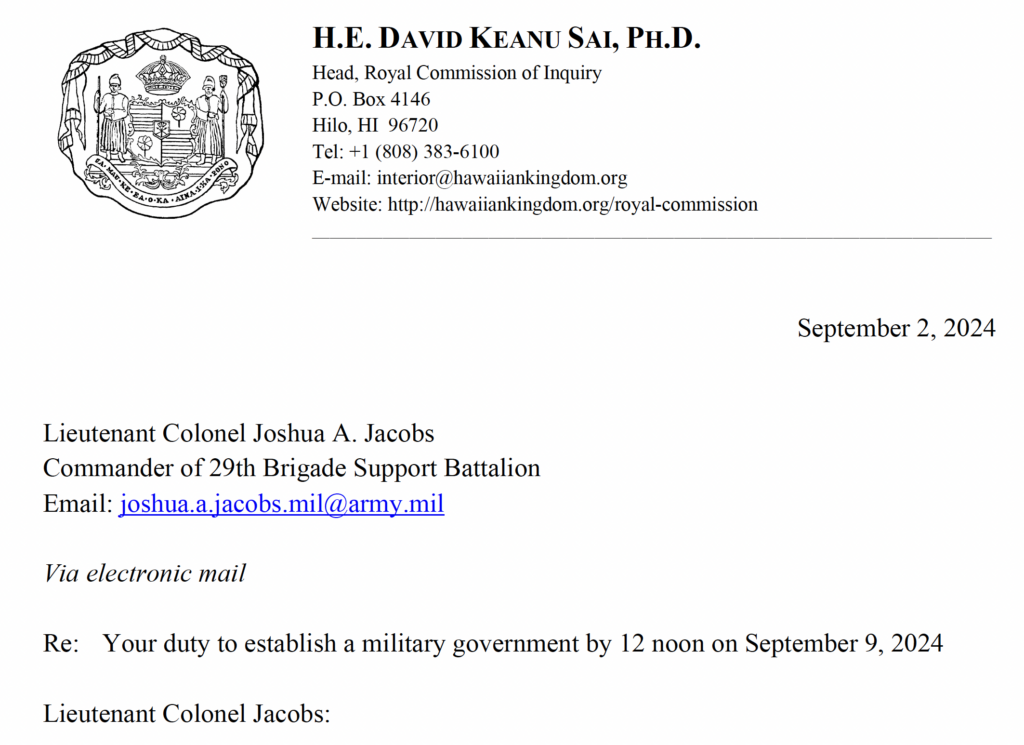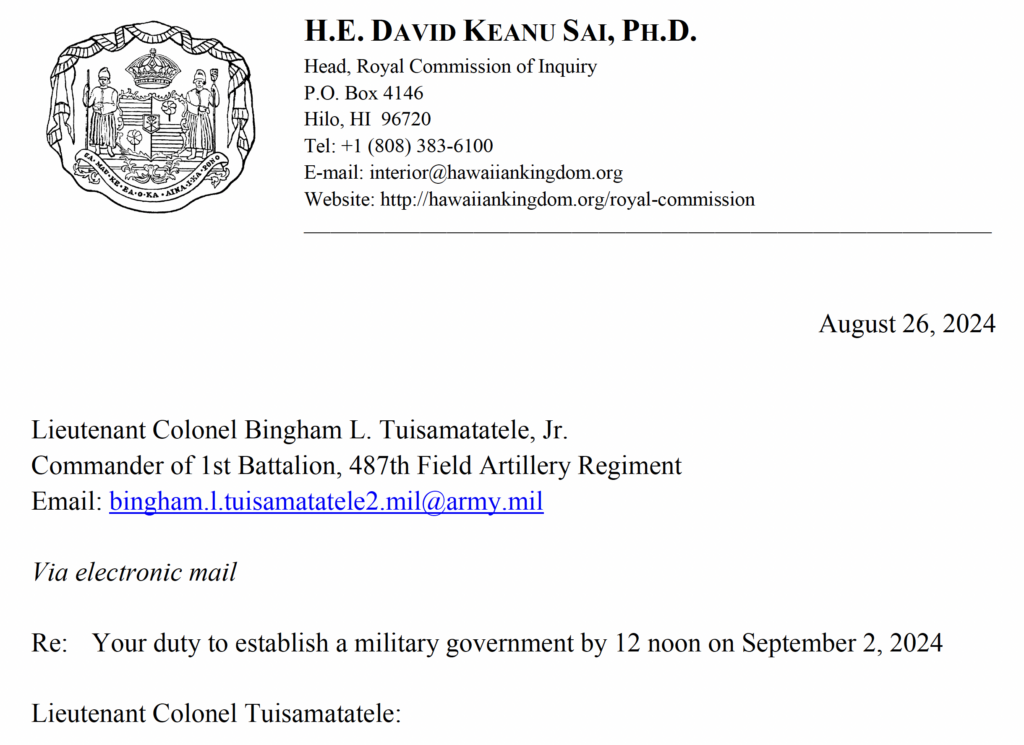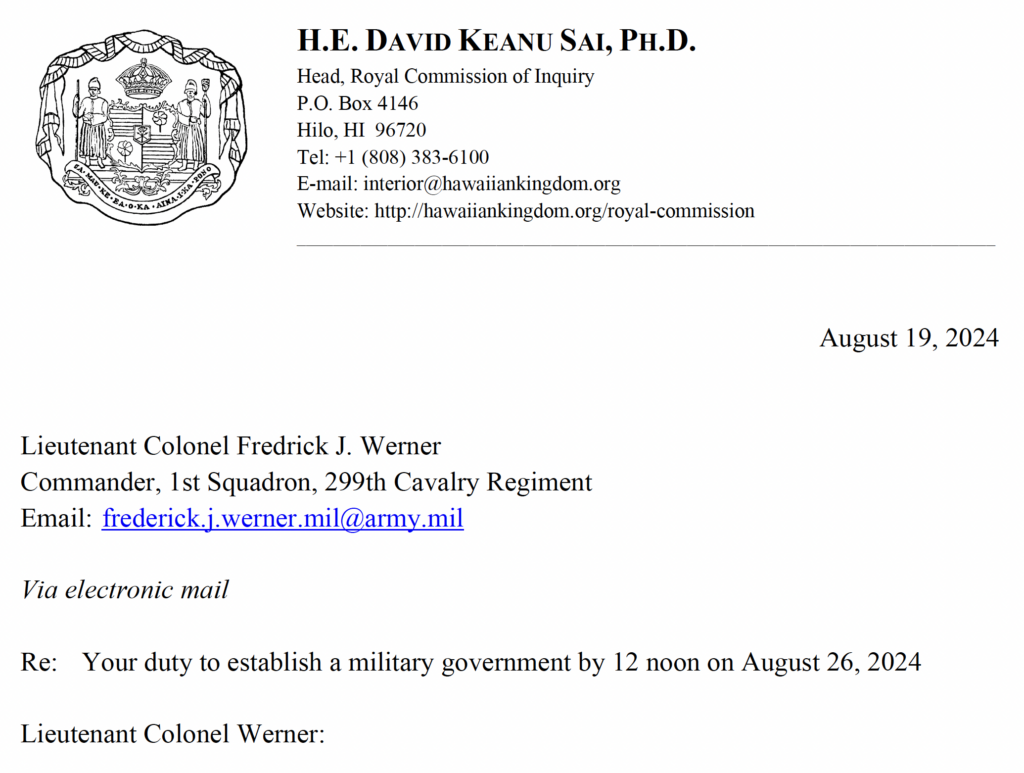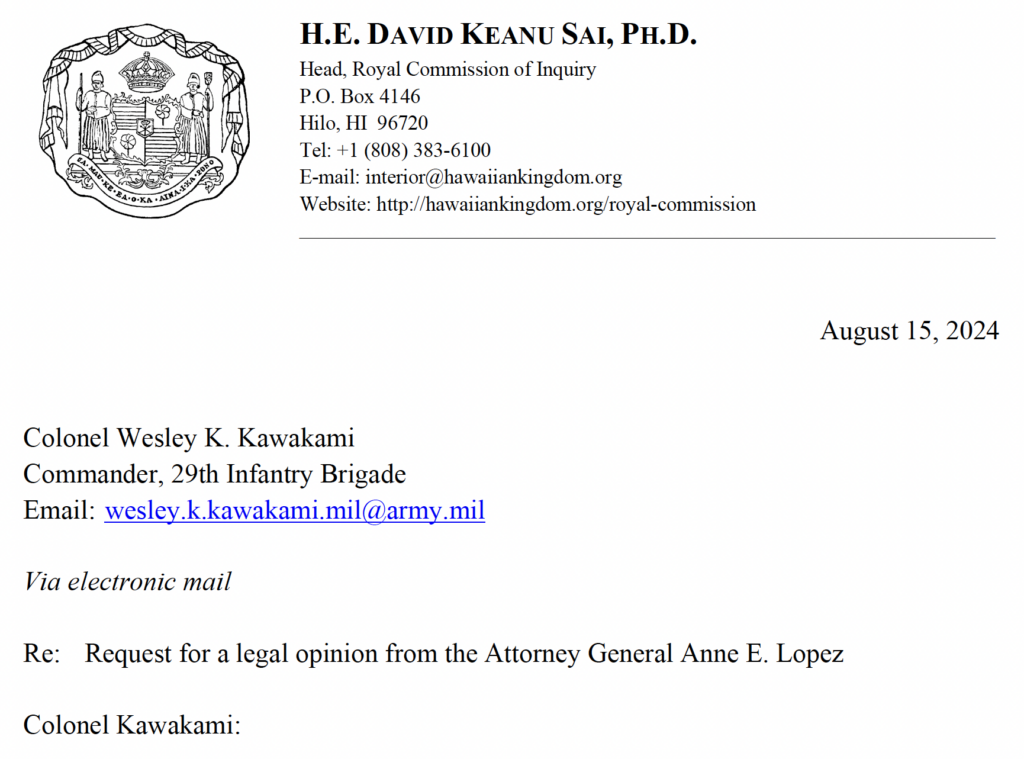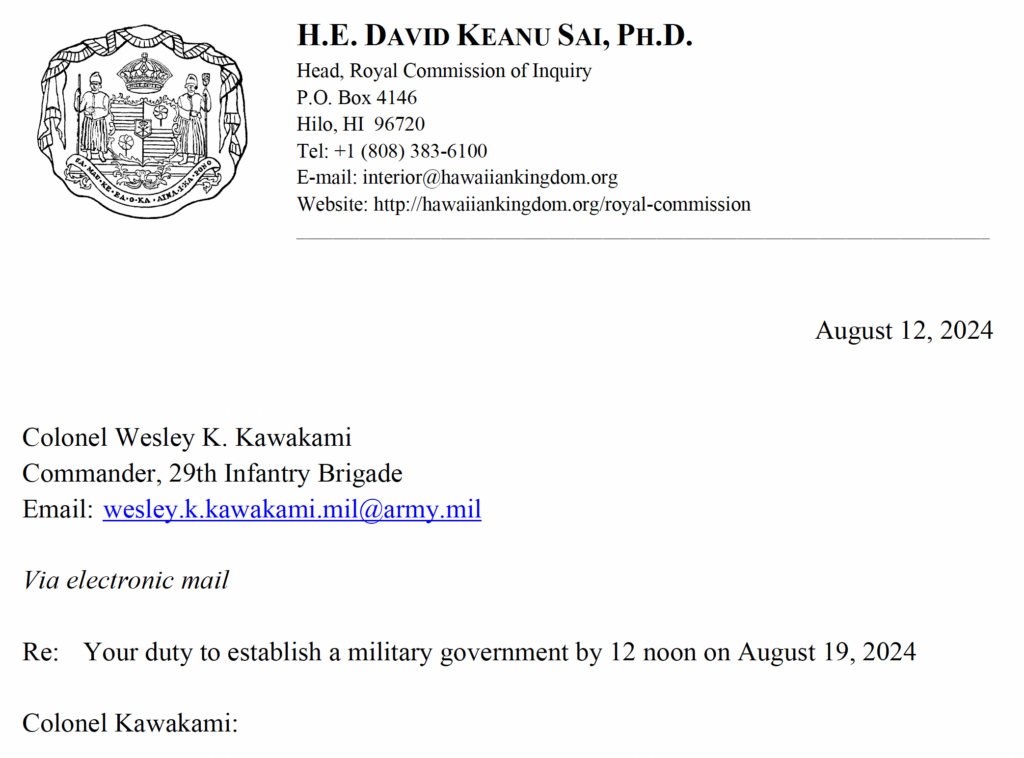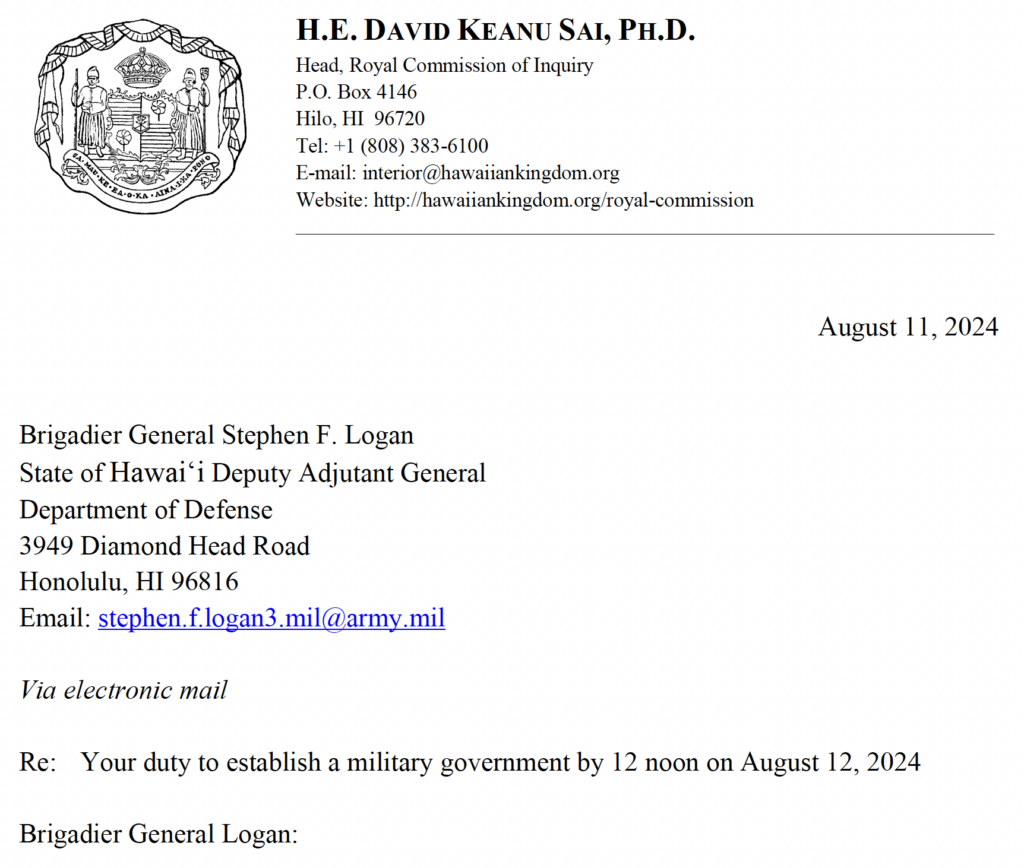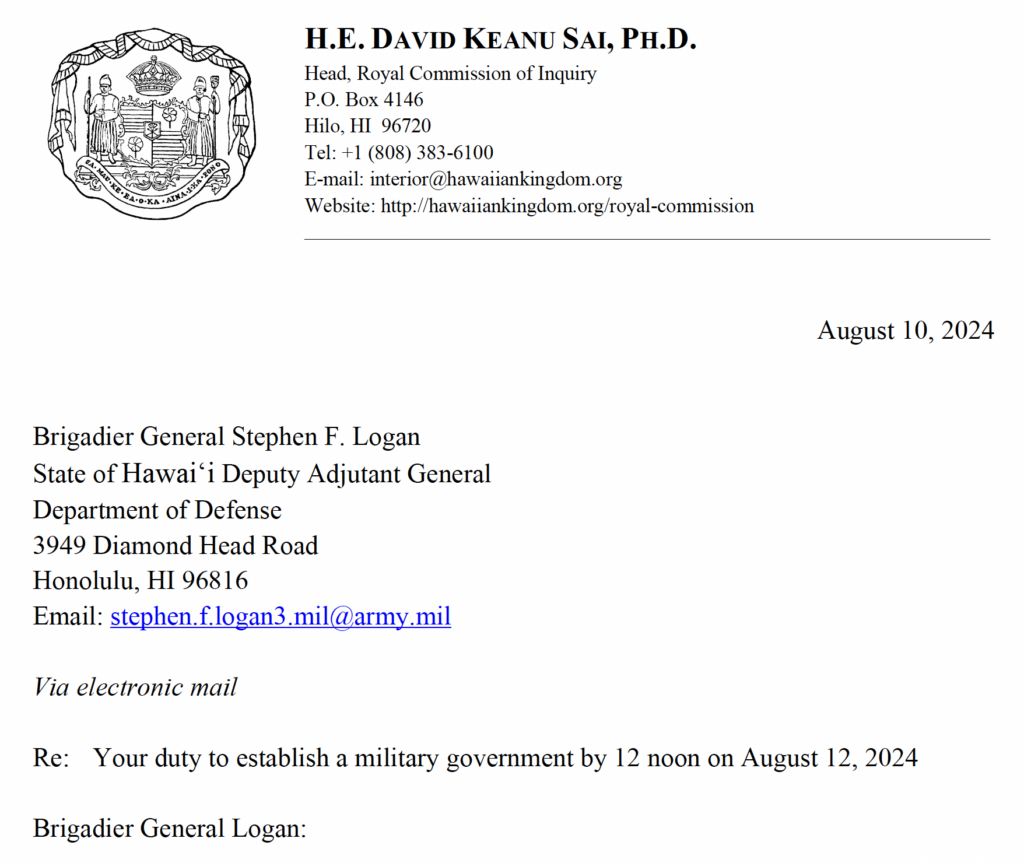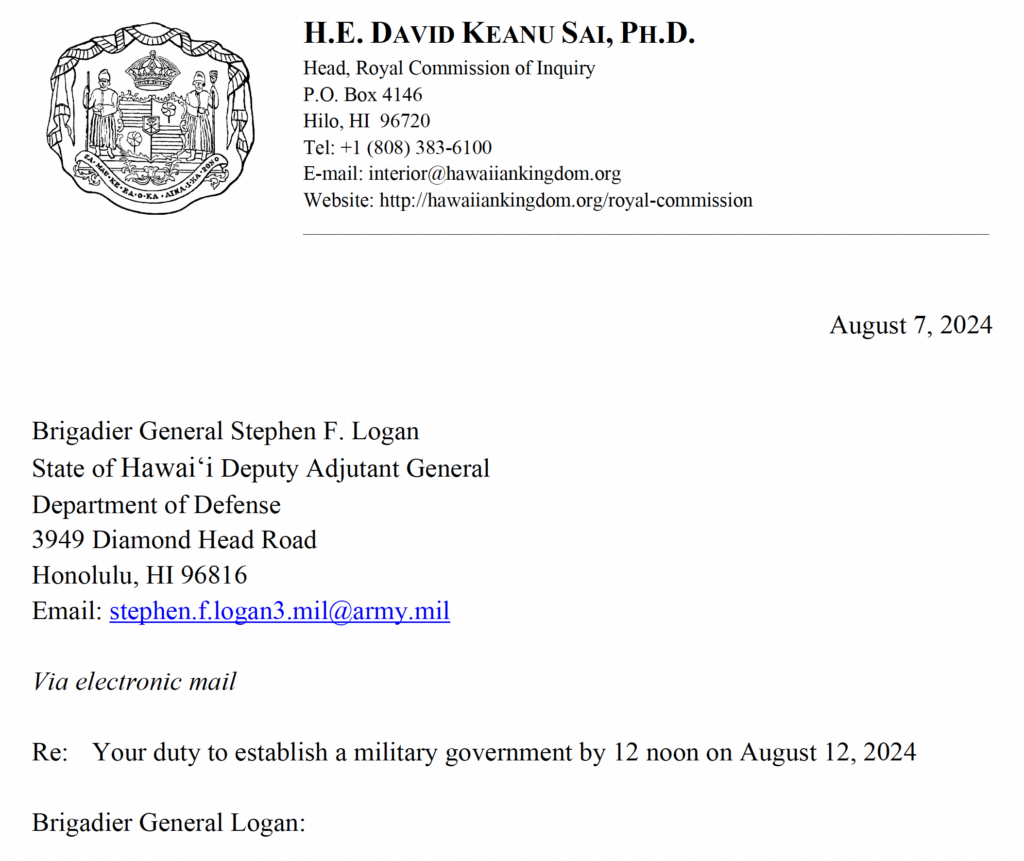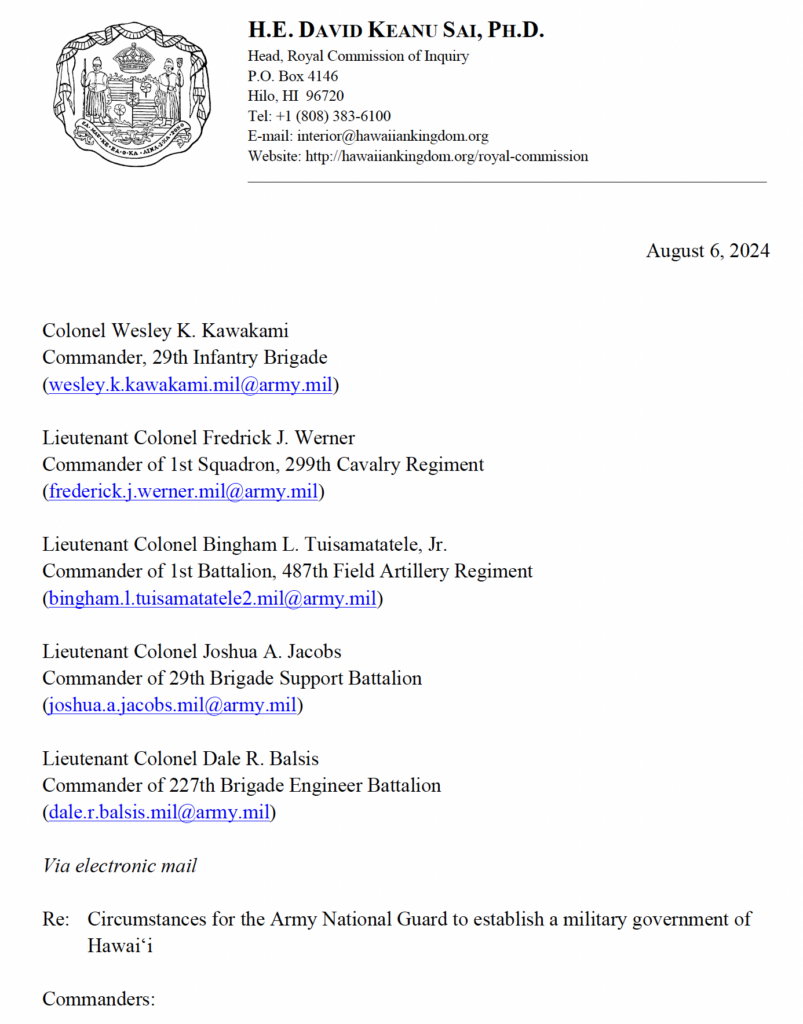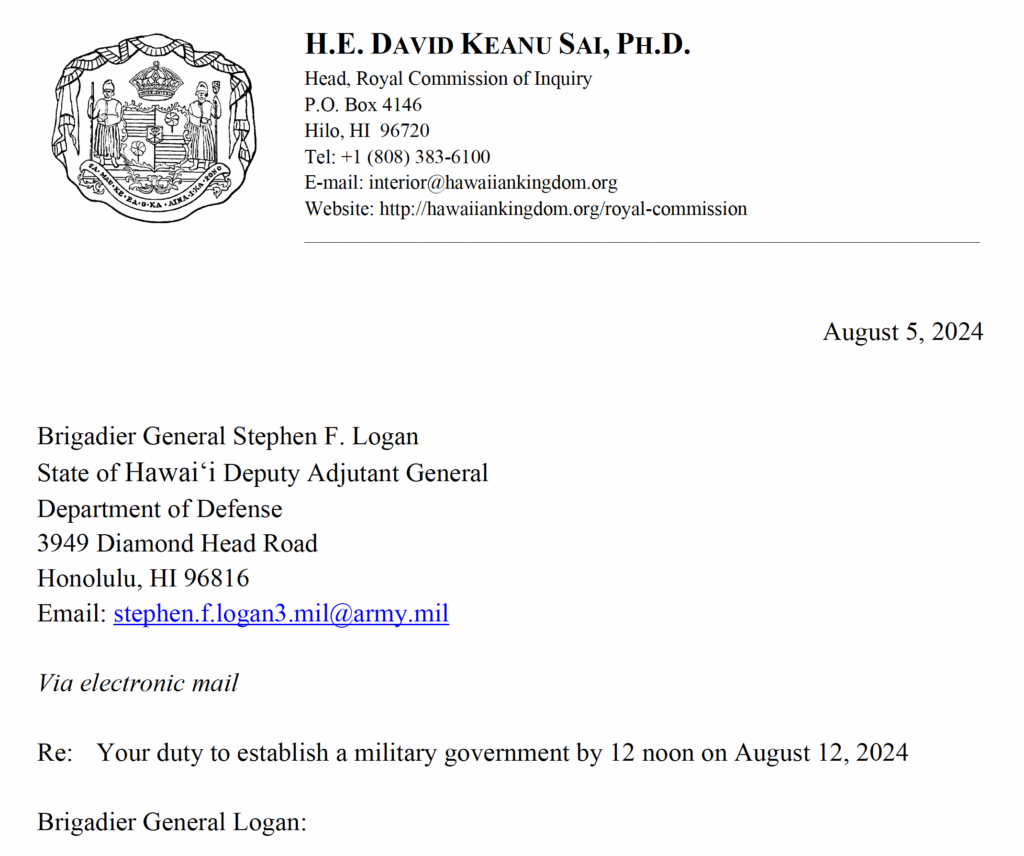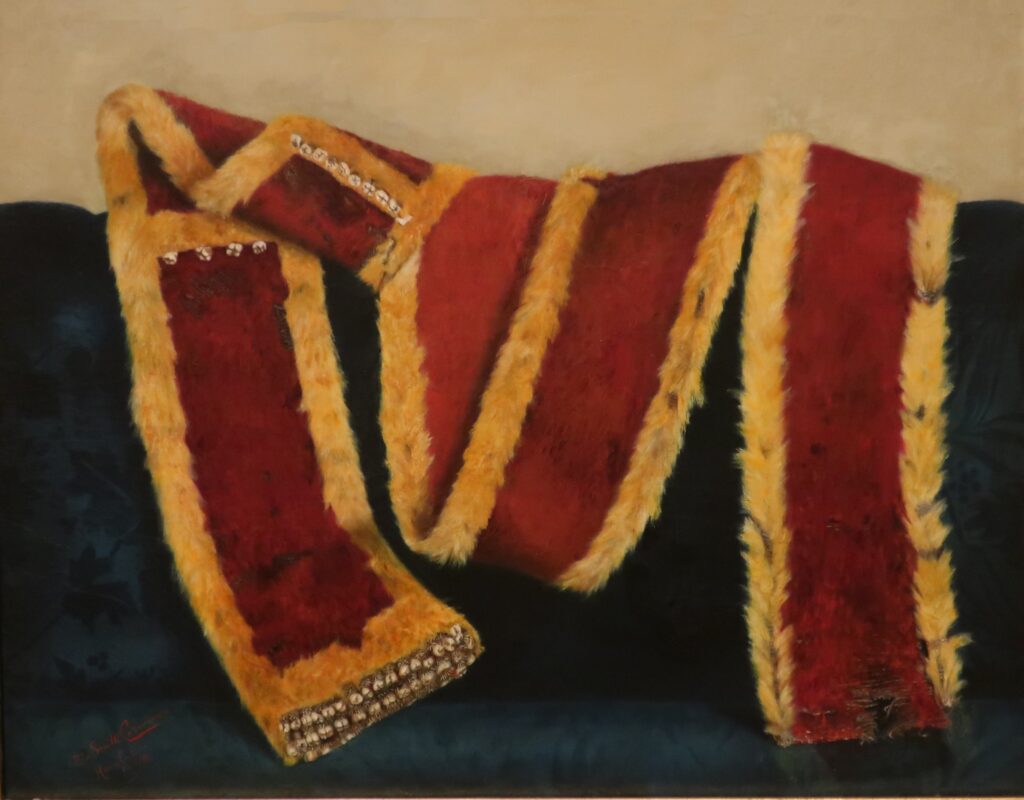After United States troops invaded and overthrew the government of the Hawaiian Kingdom on January 17, 1893, international law, at the time, required the United States, as the occupant, to maintain the status quo of the occupied State until a treaty of peace was agreed upon between the Hawaiian Kingdom and the United States. To maintain that status quo of the Hawaiian Kingdom was for the senior military commander of U.S. troops in Hawai‘i, Admiral Skerrett, Commander of the U.S.S. Boston, to take control of the Hawaiian Kingdom governmental apparatus, called a military government, and continue to administer Hawaiian Kingdom law until there is a treaty of peace. U.S. Army Field Manual 27-5 states:
The term “military government” as used in this manual is limited to and defined as the supreme authority exercised by an armed occupying force over the lands, properties, and inhabitants of an enemy, allied, or domestic territory. Military government is exercised when an armed force has occupied such territory, whether by force or agreement, and has substituted its authority for that of the sovereign or previous government. The right of control passes to the occupying force limited only by the rules of international law and established customs of war.
But Admiral Skerrett did not comply with international law and the insurgents were allowed to continue to pretend that they were the legitimate government, ever after President Cleveland told the Congress on December 18, 1893, that the “provisional government owes its existence to an armed invasion by the United States.” Five years later, in 1898, the United States unilaterally annexed the Hawaiian Islands in violation of Hawaiian State sovereignty and international law. According to U.S. Army Field Manual 27-10:
Being an incident of war, military occupation confers upon the invading force the means of exercising control for the period of occupation. It does not transfer the sovereignty to the occupant, but simply the authority or power to exercise some of the rights of sovereignty. The exercise of these. rights results from the established power of the occupant and from the necessity of maintaining law and order, indispensable both to the inhabitants and to the occupying force. It is therefore unlawful for a belligerent occupant to annex occupied territory or to create a new State therein while hostilities are still in progress.
After illegally annexing the Hawaiian Islands without a treaty with the Hawaiian Kingdom, the United States began to unlawfully impose its laws throughout the territory of the Hawaiian Kingdom. The imposition of the Occupying State’s laws over the territory of an Occupied State is the war crime of usurpation of sovereignty during military occupation. This war crime had a devastating effect on the health of the native Hawaiian people who had universal healthcare, at no cost, at Queen’s Hospital, and native Hawaiian access to lands for their homes and businesses.
Queen’s Hospital was established in 1859 by King Kamehameha IV and Queen Emma under the 1859 Hospital Act. Its purpose was to provide universal health care, at no cost, for all native Hawaiians. Under its charter the Monarch would serve as President of a Board of Trustees comprised of ten persons appointed by the government and ten persons elected by the corporation’s shareholders.
The Hawaiian government appropriated funding for the maintenance of the hospital. “Native Hawaiians are admitted free of charge, while foreigners pay from seventy-five cents to two dollars a day, according to accommodations and attendance (Henry Witney, The Tourists’ Guide through the Hawaiian Islands Descriptive of Their Scenes and Scenery (1895), p. 21).” It wasn’t until the 1950’s and 1960’s that the Nordic countries followed what the Hawaiian Kingdom had already done with universal health care.
In 1909, the government’s interest in Queen’s Hospital was severed and native Hawaiians would no longer be admitted free of charge. The new Board of Trustees changed the 1859 charter where it stated, “for the treatment of indigent sick and disabled Hawaiians” to “for the treatment of sick and disabled persons.” Gradually native Hawaiians were denied health care unless they could pay. This led to a crisis of native Hawaiian health today. Queen’s Hospital, now called Queen’s Health Systems, currently exists on the islands of O‘ahu, Molokai, and Hawai‘i.
A report by the Office of Hawaiian Affairs in 2017 stated, “Today, Native Hawaiians are perhaps the single racial group with the highest health risk in the State of Hawai‘i. This risk stems from high economic and cultural stress, lifestyle and risk behaviors, and late or lack of access to health care (Native Hawaiian Health Fact Sheet 2017, p. 2).” Hawaiians should not have died due to “late or lack of health care” because Queen’s Hospital was an institution that provided health care at no cost.
Another right of native Hawaiians, under Hawaiian Kingdom law, was access to government land for a home and/or business. Under the 1850 Kuleana Act, which has not been repealed by the Hawaiian Legislature and remained a law in 1893, native Hawaiians can receive from the Minister of the Interior up to 50 acres in fee-simple at $.50 an acre. According to the inflation calculator, $.50 in 1893 would be $20 today. So, for a quarter acre for a home, a native Hawaiian need only to pay $5.
According to the U.S. Census of 2022, there are 714,847 native Hawaiians. The majority of native Hawaiians presently reside in the United States. The reason for native Hawaiians moving to the United States is attributed to Hawai‘i’s high cost of living.
On February 20, 2024, Hawai‘i News Now did a story “Hawaii’s high cost of living testing patience of residents, poll shows.” The report interviewed two native Hawaiians, Patricia Pele and Kahi Kaonohi.
Patricia Pele grew up on Molokai and wanted to pursue a career in the state after graduating from Chaminade, but ultimately chose to move.
She and her partner Nathan Estes previously rented a one-bedroom apartment in Aiea for $1,700 a month.
They now pay less than half that for a home in Dayton, Ohio.
“We have a four-bedroom house and our mortgage is a little bit less than $700 a month,” Estes said. “Two full baths, a covered garage with extra driveway space.”
Pele acknowledges she misses home and struggled to adjust, but financial flexibility outweighed being homesick.
“You’ll get happy in paradise, but you’ll also have to pay that price,” Pele said. “It’s unfortunate that it takes multi-generational income under one roof, multiple jobs. I think all my friends had at least two jobs if not three and that was with another spouse or significant other.”
For lifelong Windward Oahu native and musician Kahi Kaonohi, leaving the islands isn’t an option.
“Hawaii to me is my home and it’s a special place,” Kaonohi said. “I just feel that I have to do and my wife, we just have to do what we have to do to live here.”
Kaonohi and his wife have six kids and 10 grandchildren.
He says all but one of his children still live on Oahu and while he’s retired, they’re in the daily grind.
“Every day items that used to be $1.50 is now $4.75, how did that happen?,” Kaonohi said. “It’s still the same product. How did it go for four dollars more?”
According to U.S. News, “Cost of Living: How to Calculate How Much You Need,” it explains how to calculate the cost of living.
Simply add up all of your monthly fixed expenses, like rent or a mortgage payment, and your variable expenses, such as groceries and gas costs. Also factor in occasional but expected purchases, such as new tires. The resulting amount, assuming you aren’t going to debt every month, is your cost of living.
Under the American occupation, Hawai‘i’s economy is the combination of inflated high costs for housing, healthcare and groceries. To live comfortably in Honolulu, you will need an annual income of $200,000. The U.S. Census, in 2019, had the median household income at around $80,000. According to Payscale.com, the cost of living in Honolulu is 84% higher than the average in the United States, housing is 214% higher, utilities is 42% higher, and groceries is 50% higher. On O‘ahu, the median price for a home is $1,100,000 and the median price for an apartment is $510,000. These high costs for home purchasing forces people to rent. The average median monthly rent for all islands is $3,000.
Contributing to the high cost of groceries, Hawai‘i imports 85-90% of food. The money it costs to bring this food, by sea or air, to the Hawaiian Islands is passed on to the consumer. In other words, the cost of fuel and labor on the planes or ships that carry the food, in addition to the cost of producing the food itself, is included in the costs to the buyer of the food.
In 1893, the Hawaiian Kingdom had the reverse where it produced over 90% of its own food for the Hawaiian economy. According to the Hawaiian Almanac and Annual for 1893, the Hawaiian Kingdom, in 1891, exported 58% of its goods and imported 42%. The major articles for exports from 1862-1891 were sugar, molasses, rice, coffee, bananas, goat skins, hides, tallow, wool, betel leaves, sheep skins, guano, fruit, pineapples, vegetables, plants, and seeds. The major trading partners with the Hawaiian Kingdom from 1885 to 1893 were the United States, Great Britain, Germany, British Columbia, Australia, New Zealand, China, Japan and France. The Hawaiian Kingdom had a healthy economy.
The failure for the United States to maintain this status quo during the American occupation is not only a gross violation of international law but it, consequently, placed the native Hawaiian population in a dire situation in their own country. In his memorandum, as Minister of the Interior, Dr. Keanu Sai states:
While the State of Hawai‘i has yet to transform itself into a Military Government and proclaim the provisional laws, as proclaimed by the Council of Regency, that brings Hawaiian Kingdom laws up to date, Hawaiian Kingdom laws as they were prior to January 17, 1893, continue to exist. The greatest dilemma for aboriginal Hawaiians today is having a home and health care. Average cost of a home today is $820,000.00. And health care insurance for a family of 4 is at $1,500 a month. According to the Office of Hawaiian Affairs’ Native Hawaiian Health Fact Sheet 2017, “Today, Native Hawaiians are perhaps the single racial group with the highest health risk in the State of Hawai‘i. This risk stems from high economic and cultural stress, lifestyle and risk behaviors, and late or lack of access to health care.”
Under Hawaiian Kingdom laws, aboriginal Hawaiian subjects are the recipients of free health care at Queen’s Hospital and its outlets across the islands. In its budget, the Hawaiian Legislative Assembly would allocate money to the Queen’s Hospital for the healthcare of aboriginal Hawaiian subjects. The United States stopped allocating moneys from its Territory of Hawai‘i Legislature in 1909. Aboriginal Hawaiian subjects are also able to acquire up to 50 acres of public lands at $20.00 per acre under the 1850 Kuleana Act. With the current rate of construction costs, which includes building material and labor, an aboriginal Hawaiian subject can build 3-bedroom, 1-bath home for $100,000.00.
Hawaiian Kingdom laws also provide for fishing rights that extend out to the first reef or where there is no reef, out to 1 mile, exclusively for all Hawaiian subjects and lawfully resident aliens of the land divisions called ahupua‘a or ‘ili. From that point out to 12 nautical miles, all Hawaiian subjects and lawfully resident aliens have exclusive access to economic activity, such as mining underwater resources and fishing. Once the United Nations Convention on the Law of the Sea is acceded to by the Council of Regency, this exclusive access to economic activity will extend out to 200 miles called the Exclusive Economic Zone.
Major General Kenneth Hara and Brigadier General Stephen Logan denied all native Hawaiians their legal right to access free health care at Queen’s Hospital throughout the islands, and denied them their legal right to access government land to build a home or business, because they were both willfully derelict in their duty to establish a military government of Hawai‘i in accordance with the Law of Armed Conflict—international humanitarian law, U.S. Department of Defense Directive 5100.01, and Army Regulations—FM 27-5 and FM 27-10. Thus, becoming war criminals for the war crime by omission.
This duty to establish a military government is now on the shoulders of Colonel Wesley Kawakami, Commander of the 29th Infantry Brigade of the Hawai‘i Army National Guard. He has until 12 noon on August 19, 2024, to transform the State of Hawai‘i into a military government of Hawai‘i. The Council of Regency’s Operational Plan for transitioning the State of Hawai‘i into a Military Government will provide Colonel Kawakami guidance to do so. If Colonel Kawakami is derelict in his duty and consequently commits the war crime by omission, it will fall upon the next officer in the chain of command to perform. This will continue until someone in the Army National Guard performs their military duty.

